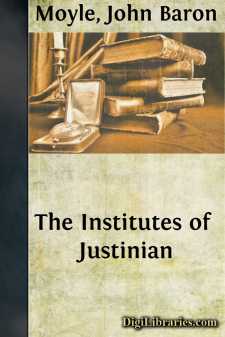Categories
- Antiques & Collectibles 13
- Architecture 36
- Art 48
- Bibles 22
- Biography & Autobiography 813
- Body, Mind & Spirit 142
- Business & Economics 28
- Children's Books 15
- Children's Fiction 12
- Computers 4
- Cooking 94
- Crafts & Hobbies 4
- Drama 346
- Education 46
- Family & Relationships 57
- Fiction 11828
- Games 19
- Gardening 17
- Health & Fitness 34
- History 1377
- House & Home 1
- Humor 147
- Juvenile Fiction 1873
- Juvenile Nonfiction 202
- Language Arts & Disciplines 88
- Law 16
- Literary Collections 686
- Literary Criticism 179
- Mathematics 13
- Medical 41
- Music 40
- Nature 179
- Non-Classifiable 1768
- Performing Arts 7
- Periodicals 1453
- Philosophy 64
- Photography 2
- Poetry 896
- Political Science 203
- Psychology 42
- Reference 154
- Religion 513
- Science 126
- Self-Help 84
- Social Science 81
- Sports & Recreation 34
- Study Aids 3
- Technology & Engineering 59
- Transportation 23
- Travel 463
- True Crime 29
The Institutes of Justinian
by: John Baron Moyle
Categories:
Description:
Excerpt
TITLE I. OF JUSTICE AND LAW
Justice is the set and constant purpose which gives to every man his due.
1 Jurisprudence is the knowledge of things divine and human, the science of the just and the unjust.
2 Having laid down these general definitions, and our object being the exposition of the law of the Roman people, we think that the most advantageous plan will be to commence with an easy and simple path, and then to proceed to details with a most careful and scrupulous exactness of interpretation. Otherwise, if we begin by burdening the student's memory, as yet weak and untrained, with a multitude and variety of matters, one of two things will happen: either we shall cause him wholly to desert the study of law, or else we shall bring him at last, after great labour, and often, too, distrustful of his own powers (the commonest cause, among the young, of ill-success), to a point which he might have reached earlier, without such labour and confident in himself, had he been led along a smoother path.
3 The precepts of the law are these: to live honestly, to injure no one, and to give every man his due.
4 The study of law consists of two branches, law public, and law private. The former relates to the welfare of the Roman State; the latter to the advantage of the individual citizen. Of private law then we may say that it is of threefold origin, being collected from the precepts of nature, from those of the law of nations, or from those of the civil law of Rome.
1 The law of nature is that which she has taught all animals; a law not peculiar to the human race, but shared by all living creatures, whether denizens of the air, the dry land, or the sea. Hence comes the union of male and female, which we call marriage; hence the procreation and rearing of children, for this is a law by the knowledge of which we see even the lower animals are distinguished. The civil law of Rome, and the law of all nations, differ from each other thus. The laws of every people governed by statutes and customs are partly peculiar to itself, partly common to all mankind. Those rules which a state enacts for its own members are peculiar to itself, and are called civil law: those rules prescribed by natural reason for all men are observed by all peoples alike, and are called the law of nations. Thus the laws of the Roman people are partly peculiar to itself, partly common to all nations; a distinction of which we shall take notice as occasion offers.
2 Civil law takes its name from the state wherein it binds; for instance, the civil law of Athens, it being quite correct to speak thus of the enactments of Solon or Draco. So too we call the law of the Roman people the civil law of the Romans, or the law of the Quirites; the law, that is to say, which they observe, the Romans being called Quirites after Quirinus. Whenever we speak, however, of civil law, without any qualification, we mean our own; exactly as, when 'the poet' is spoken of, without addition or qualification, the Greeks understand the great Homer, and we understand Vergil....


